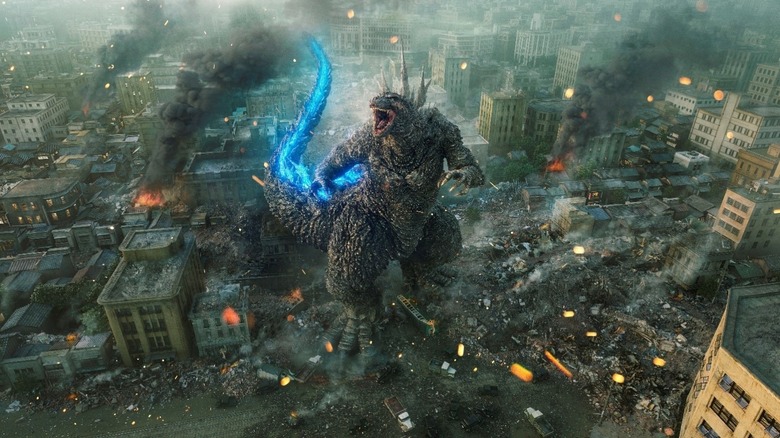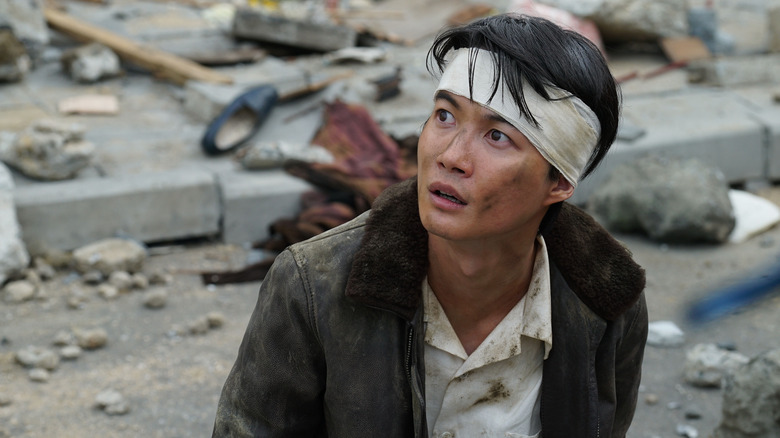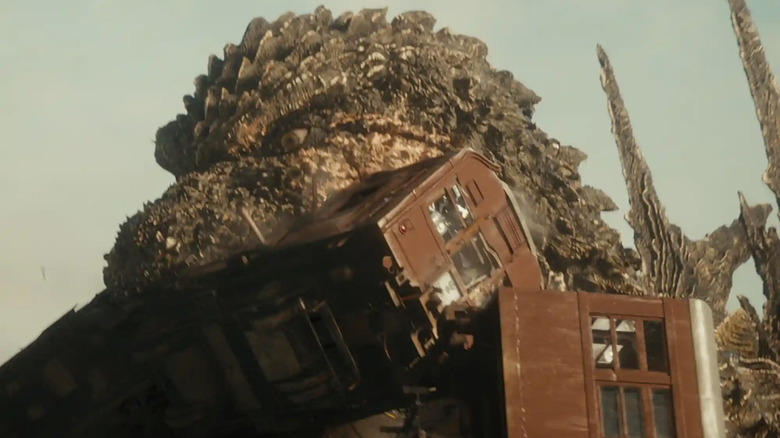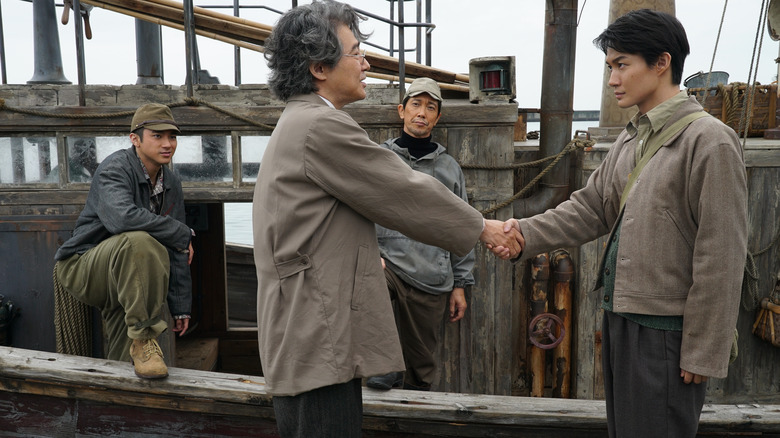Godzilla Minus One Director And Star On Making Godzilla Terrifying Again [Exclusive Interview]
"Godzilla Minus One" is one of the best movies of the year. This is a film that takes the King of Monsters back to basics, ignoring the other kaiju in the Tohoverse and instead doing kind of a retelling of the very first "Godzilla." Except it doesn't feel like just a remake, but a return to form. Hideaki Anno gave the franchise new life with his satirical 2016 film "Shin Godzilla," which focused more on the chaotic and often wacky reactions to Godzilla invading modern-day Japan. Now, director, writer, and VFX director Takashi Yamazaki ("Lupin III: The First") takes us back in time and makes Godzilla once again a source of pure terror and a not-at-all-subtle allegory for nuclear armageddon.
Yamazaki reinvents the titular Godzilla in fascinating ways. He adds his own touch to the iconic character's nearly 70-year history by turning Godzilla's atomic breath into a devastating weapon of mass destruction that would make J. Robert Oppenheimer weep. Even at a much smaller budget than its American counterparts, Yamazaki's "Godzilla Minus One" has some of the most stunning visuals in a "Godzilla" movie to date when it comes to the titular character and the destruction it leaves behind.
And unlike the American MonsterVerse, "Godzilla Minus One" actually presents a poignant human story that is as powerful as the kaiju stuff. Star Ryunosuke Kamiki plays a kamikaze pilot suffering from survivor's guilt in post-war Japan, with the movie exploring nuanced themes of collective trauma and the feelings of despair and mistrust in authority that arose in the immediate aftermath of the end of World War II.
/Film talked with director Takashi Yamazaki and star Ryunosuke Kamiki about bringing Godzilla back to basics, the responsibility of being a part of this franchise, and Yamazaki's wish to direct a "Star Wars" movie.
Note: This interview has been lightly edited for clarity and brevity.
'I felt it was really important to examine human perseverance under those circumstances'
The post-war setting for the film allows you to explore some political themes, and the survivor's guilt of the main character, and the trauma that people are feeling, and how they're feeling about war and the government in general. Why was it important to you to explore these themes in the movie?
Yamazaki: I chose the post-World War II setting because I felt it was really important to examine human perseverance under those circumstances. People had nothing and, despite that, Godzilla comes back to ruin their lives, and what do they do? I thought it'd be a really interesting movie to see how these people without any major weapons or anything can get through a Godzilla attack.
Kamiki-san, you worked on big movies based on popular characters like "JoJo's Bizarre Adventure" and "Rurouni Kenshin." How does it feel when you step into a project like this where people know and love the character, and having the responsibility of playing within that world?
Kamiki: With fan-based projects, for me, as an actor, it's been about recreating. So let's say bringing a character from manga to life, I'm transposing a lot of the visuals or how they speak and things like that. In the case of "Godzilla," you have the history, you have the fans, and I feel that each "Godzilla" movie on its own has its own unique themes. Coming into "Godzilla Minus One," I was in a circumstance where I didn't have to worry about the original works of "Godzilla," so there's no pressure there. Those were a little bit of a different approach I took as an actor for "Godzilla Minus One."
'We should remember that now in 2023'
Yamazaki-san, every Godzilla movie adds to the character and to its powers and its look. Something you do here is when Godzilla uses his atomic breath, the spines glow and grow, and it's a very interesting vision. I'm curious why that was important to you to add that and play with such an iconic visual.
Yamazaki: With the beam, I really wanted to make it the most powerful of all the Godzillas. That's my intent, and that's how we developed the design, but also I wanted to call back to the original "Godzilla." A lot of scholars and stuff, we see that Godzilla represented war and the effects of atomic weapons and things like that, and I also felt that I think it might be around time that the world needs to be reminded that Godzilla did represent those things at one point and, perhaps, we should remember that now in 2023.
Yamazaki-san, you also do the visual effects in addition to directing. I'm curious how knowing how the visual effects are going to look helps you in directing, and vice versa.
Yamazaki: For myself, as a VFX background, the goal really at the end of the day is always to seamlessly blend the VFX with the real world and everything else that needs to be added in. Not too long ago, you had separate directors — you had a VFX director and then you had the film director. But I think it's almost just an additional tool that I have so that, once we're in post, I can actually do a lot more checks of the work as it comes out. You also have to keep in mind, relative to Hollywood, [that in] Japan, generally, the budgets are lower, so we're also fighting against that. VFX, the process itself, is mostly about doing trial and error, so being able to run through the trial and errors more times in a day and then being able to check them. By being the VFX supervisor and directing it, I was able to increase the number of times I was checking all the VFX.
'I hope they call me up'
Kamiki-san, especially for American audiences where, of course, the character they know is Godzilla, for you as the protagonist, as the one person who speaks, how do you make that character feel as important or as essential as Godzilla?
Kamiki: For me, it was actually more about delving into the role of Shikishima and everything that he is carrying. For myself, Shikishima is in the deepest, darkest place at the beginning, and really just cutting away any of extraneous thoughts and just really delving and focusing on who he is and where he is in his journey. I really just hoped that I would go on a journey of discovery with the character. This is obviously shot on green screen and there's all these technical things that I really didn't need to have to think about it too much and just focus on who I was and what it's like to put your life on the line for something. What is that like? And, of course, believing the director when he shot and he said, "It's a good take." I believe in the director. We move on.
Yamazaki-san, you've done movies based on a lot of big manga and properties like "Godzilla." I'm curious, is there one dream project that you haven't done, one property or franchise that you want to play with?
Yamazaki: I watched "Star Wars," and that's how I ended up being a filmmaker, and I'm really hoping I will get a call and they will me bring me on "Star Wars." I think a more Japanese or even just Eastern take on "Star Wars," I think, would be really, really interesting, so I hope they call me up.
"Godzilla Minus One" is in theaters now.



